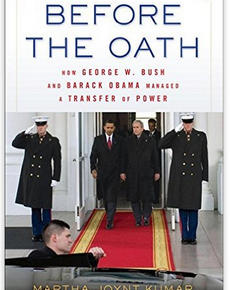
The Best Transition In History

The Bush to Obama transition was the smoothest in our nation’s history, because the two leaders made it a priority to invest significantly in planning and preparation. The details of this successful transition are the subject of a new book, “Before the Oath,” by noted Presidential scholar Dr. Martha Kumar.
Recently, Max Stier, President and CEO of the Partnership for Public Service, hosted a panel discussion that focused on Dr. Kumar’s insights from her research and dozens of interviews. Labor Deputy Secretary Chris Lu, who served as Executive Director of President Obama’s 2008 transition team; and Clay Johnson, who was a key advisor to President George W. Bush and ran the Presidential Personnel Office (PPO) at the beginning of the Bush administration, joined Dr. Kumar in a fascinating and wide-ranging ninety minute discussion.
The topic was lessons learned and best practices in Presidential transitions, and the three panelists had a wealth of insights to share on how to make the Presidential transitions work. However Lu and Johnson, two veterans of transitions and governing, also had much to say on the critical importance of effective management to the success of an administration – and the importance of focusing early in the transition on management.
The Partnership, through its Ready to Govern initiative, and the IBM Center for The Business of Government have teamed together to develop a Management Roadmap for the next administration. So, while management was not the focus on the panel, it was of great interest to hear Lu and Johnson both speak about the importance of infusing management capabilities into a new administration in order to bolster the policy and political fortunes of the President.
As the panelists made clear, irrespective of political party or ideology, there are core management actions and skills that every administration can – and should – take to ensure the smooth operations of government and to drive the effective implementation of policy objectives. In fact, there was very little daylight between Lu and Johnson on the importance of management. As Chris Lu noted “the business of government needs to keep running.”
Some of the panel insights and suggestions included:
- Goals cannot be clear enough. Whether policy goals or management goals, all success begins with leaders setting clear goals. If the goals are clear – and communicated – then people in an organization will align their actions and energies to the achievement of those goals.
- Establish an “outcome orientation” in an administration. Set goals first – followed by specific time frames, objectives, plans, accountability, metrics, etc.
- There is a lot of important work being done across government to improve government operations. The next administration – irrespective of party – should look to continue many parts of the current management agenda and not throw out legacy programs that are working. Casting out previous initiatives ends up hurting the new President because it slows down important reforms, impedes operational capabilities and increases costs.
- Greater focus on cross-cutting issues is needed in government – along with experienced employees who can work across agency boundaries.
- When it comes to staffing, the first year of an administration is the most important. The Director – and all staff – of the Presidential Personnel Office should commit to stay for at least one year. Lack of continuity in this office can hobble an administration with long-lasting effects.
- The confirmation process is badly broken. It is lengthy, cumbersome and intrusive, and is an impediment to getting good people to serve. Reforming the confirmation process should be a non-partisan priority for both parties.
- The next administration should create a “clearinghouse” model of staffing for senior operational roles – for example chief operating officers, chief financial officers, and general counsels. This would drive greater consistency in skill-sets and in job expectations for important operational roles.
- Early in the transition process as key people (Cabinet Secretaries and key Agency heads) are being selected – the “Lieutenants” those people need around them to be successful also need to be quickly put into place. Without a supporting cast new Secretaries and Agency heads can be rendered ineffective.
- Senior career staff are critically important. Incoming leaders need to quickly engage senior career staff and take the leap of faith to trust career staff. The trust comes eventually and the most effective leaders understand that the faster they create trust with the career staff the more they can get accomplished.
- Even during a transition the business of government goes on – payments get sent out, taxes get collected, borders get patrolled, etc. So while a new administration is (understandably) focused on new policy objectives, attention needs to be paid to putting the right people into those roles that are primarily related to government operations (see OPM, data breach).
Over the next 18 months, as the IBM Center and the Partnership develop the Management Roadmap, we will continue to draw upon the insights and experiences of a diverse set of political and career leaders. We will also seek to adhere to the panel’s leadership lesson – to start with clear goals. Our goal? To help the next administration drive sustained improvement in government’s capacity and effectiveness to support mission outcomes.
Related Reading:
Developing a Management Roadmap for the Next Administration
The Foundation for Effective Government Management in 2017 Starts Now
You’ve Won the Presidential Campaign — Now Can You Govern?
A smooth presidential transition can’t be done in just a few weeks
How Can the Next Administration Build A Strong Political and Career Leadership Team?



